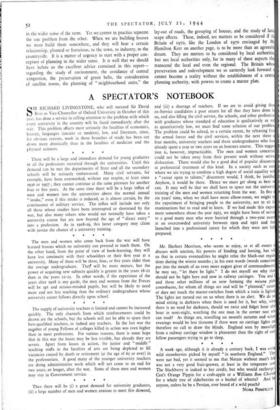Thus there will be (i) a great demand for university
graduates, (ii) a large number of men and women anxious to meet this demand, and (iii) a shortage of teachers. If we are to avoid giving the ex-Service candidates a poor return for all that they have done f us, and also filling the civil service, the schools, and other professio with graduates whose standard of education is qualitatively as w as quantitatively low, we must find some solution of our proble The problem could be solved, to a certain extent, by releasing fr the armed forces and the civil services, within the next three four months, university teachers and those undergraduates who ha already spent a year or two years on an honours course. This sugge tion is, however, impracticable. The men and women concern could not be taken away from their present work without serio dislocation. There would also be a good deal of popular discont at preferential treatment of this kind. In a society such as our where we are trying to combine a high degree of social equality w a " career open to talents," discontent would, I think, be justifie Anyhow, it would be there. Hence we must get along as best a can. It may well be that we shall have to space out the univers training of the men and women returning from the war. In five six years' time, when we shall have more elbow-room, we might the experiment of bringing people to the university, not to sit f examinations but to read and to learn. If we had made this expe ment somewhere about the year 1925, we might have been of servt to a good many men who were hurried through a two-year -cour at an overcrowded university between 1919 and 1921 and th launched into a professional career for which they were not fu prepared.
* * * *






















 Previous page
Previous page